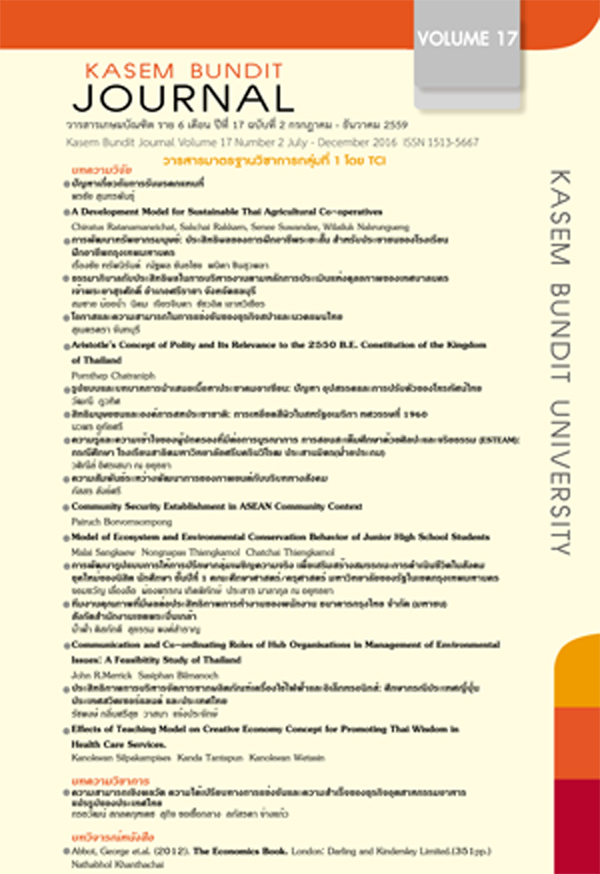การพัฒนาทรัพยากรมนุษย์: ประสิทธิผลของการฝึกอาชีพระยะสั้น สำหรับประชาชนของโรงเรียนฝึกอาชีพกรุงเทพมหานคร
Keywords:
การพัฒนาทรัพยากรมนุษย์ การฝึกอาชีพระยะสั้น กรุงเทพมหานคร ประสิทธิผลHuman resource development, Short vocational trainning courses, Bangkok Metropolitan Administration, EffectivenessAbstract
บทคัดย่อ
การวิจัยนี้มีวัตถุประสงค์ เพื่อประเมินประสิทธิผลของการฝึกอาชีพระยะสั้นของโรงเรียนฝึกอาชีพกรุงเทพมหานคร เพื่อศึกษาตัวแปรที่มีผลต่อประสิทธิผลของการฝึกอาชีพระยะสั้นของโรงเรียนฝึกอาชีพกรุงเทพมหานคร และเพื่อเสนอแนวทางแก้ไขปัญหาและอุปสรรคของการฝึกอาชีพระยะสั้นของโรงเรียนฝึกอาชีพกรุงเทพมหานคร ดำเนินวิจัยโดยใช้แบบสอบถามเป็นเครื่องมือในการรวบรวมข้อมูลจากโรงเรียนฝึกอาชีพทั้ง 10 แห่ง มีกลุ่มตัวอย่าง 120 คน และโดยการสัมภาษณ์เชิงลึก ผู้เชี่ยวชาญที่เกี่ยวข้องกับการฝึกอาชีพระยะสั้น ผลการวิจัยพบว่า การฝึกอาชีพมีประสิทธิผลต่อผู้รับการฝึกอาชีพ กล่าวคือ มีการพัฒนาคุณลักษณะของตนเอง มีความก้าวหน้าในหน้าที่การทำงาน มีการปฏิบัติงานเพื่อประโยชน์ต่อสังคมและหน่วยงานและการบริหารจัดการฝึกอาชีพของโรงเรียนฝึกอาชีพกรุงเทพมหานครในด้านสถาบัน ด้านบุคลากร และด้านวัสดุอุปกรณ์ มีผลต่อประสิทธิผลในการฝึกอาชีพระยะสั้น ผู้วิจัยเสนอแนะว่ารัฐควรจัดอบรมหลักสูตรอาชีพระยะสั้น เน้นหลักสูตรอาชีพสำคัญ และหลักสูตรอาชีพด้านบริหารจัดการและบริการ ทุกภาคส่วนยึดถือมาตรฐานแรงงานฝีมือเดียวกัน ทดสอบมาตรฐานอย่างสม่ำเสมอเพื่อสามารถปฏิบัติงานได้อย่างมีสมรรถนะ มีประกาศนียบัตรรองรับให้ และ โรงเรียนฝึกอาชีพกรุงเทพมหานครควรปรับเพื่อรองรับ “ประเทศไทย 4.0”โดยเฉพาะด้านดิจิทัล เพื่อให้ผู้ฝึกอาชีพนำไปประกอบอาชีพ และติดตามความก้าวหน้าได้ทันเทคโนโลยีที่เปลี่ยนแปลงไป
Abstract
This research aimed to evaluate the effectiveness of the short vocational training courses of BMA vocational training schools, to investigate the variables affecting the effectiveness of the short vocational training courses, and to provide solutions to the obstacles of the short vocational training courses. The researcher collected data by means of questionnaires from a sample of 120 trainees from ten vocational training schools and conducted in-depth interviews with experts working for the short vocational training courses. It was found that the short vocational training courses resulted in an improvement in the vocational trainees’ competence, career advancement, and dedication to work and charities. Meanwhile, the management of BMA vocational training courses significantly affected the effectiveness of the training programme. It was recommended that the government establish that people take vocational training courses for the most in-demand jobs, as well as management and hospitality. Every sector hold itself to the same standards and have the standards tested regularly by the government. Certificates should also be awarded. Finally, BMA vocational training courses should also raise their potential to accommodate “Thailand 4.0,” especially in terms of digital technology.
References
Bangkok Metropotitan Administraton. (2545). The 6th Bangkok Metropolitan Development Pan, Educational Sector: Human Resource and Social Development (2545-2549). Bangkok: Office of Strategy and Evaluation.
Nathabhol Khanthachai. (2557). Article Review “Green, Samuel B.(1991). “How many Subjects Dose it Take to Do a Regression Analysis?” Multivariate Behavioral Reasearch, 26(3): 499-510” Kasam Bundit Journal Vol.15(1): 141-144.
Pace, R.W., et.al.. (1991). Human Resource Development. Prentice-Hall.
World Economic Forum. (2013). The Global Competitiveness Report 2012-2013. Switzerland: Weforum.
Downloads
Published
How to Cite
Issue
Section
License
ทัศนคติ ความคิดเห็นใด ๆ ที่ปรากฏในวารสารเกษมบัณฑิตฉบับนี้เป็นของผู้เขียน โดยเฉพาะ มหาวิทยาลัยเกษมบัณฑิตและบรรณาธิการ ไม่จำเป็นต้องมีความเห็นพ้องด้วย







